After a diagnosis, you may be given medication as part of your treatment. Here are some of the most commonly prescribed medications:
What are they?
‘Angiotensin converting enzyme’ inhibitors, commonly known as ACE inhibitors, are one of the standard drugs to treat a heart failure condition such as dilated cardiomyopathy. The drug acts to help regulate high blood pressure
What does it do?
Angiotensin-converting enzyme (ACE) inhibitors help relax your veins and arteries to lower your blood pressure. ACE inhibitors prevent an enzyme in your body from producing angiotensin II, a substance that narrows your blood vessels. This narrowing can cause high blood pressure and force your heart to work harder. Angiotensin II also releases hormones that raise your blood pressure.
Why has this been prescribed for me?
ACE inhibitors help to reduce the workload of the heart and help to improve heart function.
Common names:
There are various types of ACE inhibitors and you can recognise them as their names always end in ‘pril’. Ramipril is most commonly prescribed for people diagnosed with Dilated cardiomyopathy.
Common side effects:
-
a dry cough
-
increased blood potassium levels (which can cause kidney failure)
-
Fatigue (tiredness)
-
dizziness
-
reduced kidney function
What else is useful to know?
Side effects may vary according to the type of ACE inhibitor you have been prescribed. If you are struggling with any side effects, we recommend getting in touch with your GP/Cardiologist.

What are they?
Beta blockers are widely used in the treatment of various cardiovascular conditions including high blood pressure, angina, heart rhythm problems, and to prevent repeat heart attacks. The use of the drugs in treating heart failure conditions is a more recent development.
Common types used in cardiomyopathy:
Bisoprolol, carvedilol
What does it do?
Non-selective beta blockers are active in blocking adrenaline and noradrenaline in other areas of the body including the heart. Selective beta blockers are used more commonly by cardiologists because their activity mostly affects the heart.
Why has this been prescribed for me?
In people diagnosed with hypertrophic cardiomyopathy they are effective in reducing symptoms of chest pain and shortness of breath. In Dilated cardiomyopathy beta blockers have been shown to reduce the energy requirement of heart muscle and improve the relaxation of the heart.
Common side effects
- Fatigue
- Dizziness
- Disturbed sleep
- Cold fingers and toes
What else is useful to know?
Beta blockers are given at a low dose initially, to allow the body to become accustomed to their action. The aim is then to gradually increase the dose over a period of weeks. It can for some people take a while for their body to adjust to starting and dose increases of beta blockers as beta blockers can lower blood pressure and heart rate.

What is it?
Amiodarone is prescribed to help regulate your heart’s rhythm and rate, it is an anti-arrhythmic medication used to treat abnormal heart rhythms.
Amiodarone is initially prescribed 3 times daily to begin with then reduced to twice daily and once daily, it is available in 100mg or 200 mg tablets. The usual maintenance dose is 200mg daily.
People taking Amiodarone are advised to protect themselves from the sun by wearing protective clothing and using a wide spectrum sun block
Your cardiologist / cardiac nurse or GP should periodically check your thyroid function, liver and kidney function whilst you are taking Amiodarone by taking a blood test.
Possible side effects of Amiodarone are:
- Feeling sick (nausea), reduced appetite or constipation.
- A metallic taste in the mouth
- Slow heart rate
- Reversible deposits in the eye (micro corneal deposits- changes to the colour of the front part of the eye), blueish halo (bright circle which surround a light source- such as headlights) or blurred vision (inability to detect the details of an object).
- Photophobia (sensitivity to light) or visual impairment (loss of sight)
- Skin rash, discolouration or photo sensitivity (skin can become sensitive to sunlight)
- Change in thyroid function- tiredness, heat or cold intolerance, weight loss or gain, heart pounding, light-headedness, restlessness, irregular menstrual periods or poor concentration
- Lung fibrosis or pneumonitis- cough, wheezing or difficulty in breathing
- Liver impairment- yellow tinge to the skin, brown or dark coloured urine, sweating or weight loss
Some medications can interact with Amiodarone, our advice is to check with your hospital or community pharmacist before taking any other medications including over the counter medications, herbal or complimentary medicines.
The following are known to react with Amiodarone:
- Grapefruit juice - this can increase the amount of Amiodarone absorbed from the stomach so it is best avoided while taking Amiodarone.
- St John’s Wort – a herbal supplement.
- Medicines that can slow heart rate - beta blockers, Verapamil, Diltiazem. These are sometimes prescribed alongside Amiodarone but careful monitoring will be needed.
- Warfarin - Amiodarone may increase the effect of warfarin. Additional blood tests are needed when Amiodarone is started, increased or decreased or stopped.
Anti-arrhythmic medicines
Digoxin- The dose of Digoxin will need to be adjusted if Amiodarone is started.
Medicines that prolong the QT interval: other medicines that are used to control heart rhythms may need to be adjusted.
